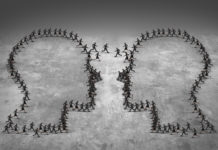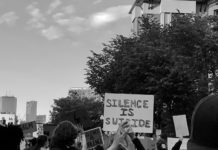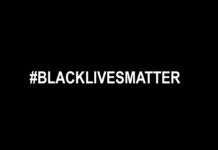Ecotherapy/Nature Therapy/Green Therapy
Do you love hiking, backpacking, gardening or taking walks in beautiful places? Ecotherapy explores how our relationship with nature is an essential and therapeutic part of our humanity.
Behavioural Geneticist Robert Plomin: “There Are No Disorders, There Are Just Quantitative Dimensions”
It is encouraging to hear leading scientists such as Plomin acknowledge that psychiatric diagnoses are fundamentally arbitrary and that the idea of a “cure” does not make sense with regards to psychological issues.
A Tale of Two Paradigms
Two recent mental health reports from Oregon are steeped in the medical model, written by "experts" without lived experience and sponsored by the pharmaceutical industry.
Stop Saying This, Part Three: “Everything in Moderation” and More
Let’s start only accepting real relational offerings that do not make us contort, disavow comfort, strong-arm ourselves into appearing strong, or shoulder responsibility that is not ours.
Identity, Oppression, and the Culture of “The Mentally Ill”
A "mental illness culture" means that full time work is seen as impossible and discouraged, and your social world only consists of other mental health "consumers" and mental health workers.
Kicking Over a Straw Woman
The Galvin family is the quintessential example of "genetic" schizophrenia. But their history of sexual abuse, violence, and trauma provides a clearer and simpler explanation.
A Recovery Movement Jedi Master, Bill Anthony, Died Recently
The first time I met Bill was in 1991. I was just a couple years out of residency, and he was already the legendary “father of psychiatric rehabilitation.”
Drs. Pies and Ruffalo Still Rattling Their Wooden Swords
Pies and Ruffalo argue that psychiatric diagnoses are "diseases" because the word "disease" can't be defined, and suggest that circular logic is scientifically valid.
An American History of Addiction: Ardent Spirits
Our fears about drugs and drug addiction have allowed our society to accept court mandated treatment and the continuing militarization of police.
Professional Mental Health Leaders: Experts in Humanity or in Marketing?
A lot of people, perhaps especially Americans, like a quick fix. Unfortunately, for those of us who get the “help” of the mental health system, the results can be disastrous.
Whose Finger is Taking the Pulse of America’s Shock Treatment Controversy?
My doctors presumed I had agitated catatonia and ran 450 volts of electricity through my head 116 times to “reboot” my brain. They called it electroconvulsive therapy (ECT). I call it Electroconvulsive Trauma.
Stop Saying This, Part Two: “Reframing” and More
Myths around reframing, having to love yourself before someone else can love you, and being triggered are all addressed in this blog.
Is COVID-19 Making Everybody Crazy?
The response to the pandemic promises a vast expansion of the market for therapists, but such claims carry great potential for harm, adding to the burdens of people with upsetting but understandable, deeply human feelings.
Racism and Radical Psychiatry
A radical caucus within the American Psychiatric Association tried to combat systemic racism in the 1960s. So why is the APA still behind the times?
Suicide & Candy Corn: The Utility and Challenges of Risk Assessments
Researchers admit their suicide risk assessments work only about as well as random guessing, and they can lead to harm. We can instead focus on finding new ways to form connections that might help tether someone to this world.
Kerry O’Malley: A Personal Struggle Against Forced Medication
Neglect for personal autonomy is a pervasive attitude in the mental health system. No human being should be stripped of their dignity and autonomy, much less a vulnerable 74-year-old woman.
Is It Time to Rethink Mental Illness in Light of the Pandemic?
Now that so many are experiencing distress because of the coronavirus, can we not appreciate that many who have been labeled mentally ill have long experienced these kinds of hardships?
Defunding the Police: Replacing Guns With Prescription Pads Is Not the Answer
Mental health workers responding to emergency calls and crises results in coercion, labelling and othering, paternalism, force, and, yes, even violence, all under the guise of “for your own good.”
Does Stranger Mean Danger?
Are those diagnosed with “mental illness” more dangerous than other people? Or have we evolved to sense danger from anything that we believe to be different or "strange"?
Stop Saying This: Phrases That Sound Helpful, But Are Actually Gaslighting, Part 1
Therapists seem to have a reference book where they go to find phrases that sound really helpful but are actually gaslighting and self-serving.
Black Suicidality and Mental Health #BlackLivesMatter
Suicides in Black communities can be understood to be caused by an institutionalized inequality that requires Black folks to negotiate their quality of life with life itself.
End Police “Wellness Checks.” Now.
If you are a mental health worker or advocate, there's a way to help dismantle police brutality and systemic racism in the U.S.
We Must Not Be Silent On George Floyd & Systemic Racism.
Dear Mad in America community: How much have we grown? Can we join together in working toward our liberation, bound together as activists?
Withdrawing Kids from Psych Drugs: Why, How, and When
Here are methods for reducing or eliminating a child's psychiatric medications that I have seen work well over years of supporting families through this process.
Recovery: Stressing the Social Basis of the Process
Recovery involves engaging in new material and social contexts and in open dialogues where new ways of understanding and handling the situation are created.

































